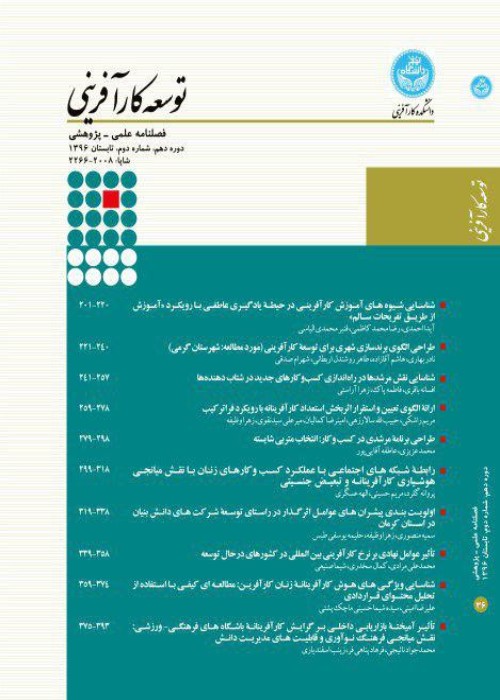A fundamental look at what and how to achieve scientific authority in humanities
Author(s):
Article Type:
Research/Original Article (دارای رتبه معتبر)
Abstract:
Objective
Since dealing with the scientific authority from a fundamental point of view is a necessity and has received little attention, this research tries to find a mechanism for the realization of scientific authority by referring to the roots of the formation of authority in science and by going through the history of the evolution of science with reference to alternative philosophical attitudes.Method
By choosing a holistic view, this research has tried to achieve comprehensiveness presentation of how authority is formed in science by applying three methods of analysis, synthesis and synthetic. Applying the method of analyzing and scrutinizing scientific-philosophical documents is the first step, synthesizing the findings from the analysis and basing them on fundamental principles based on the synthetic method is the next step in the method. Application of these three methods, which in a way shows the benefits of inductive methodology along with realism in analysis and analogical a priori in synthetics, can be a reliable method in humanities research due to the integration of methods and lack of one-sidedness, although it is often neglected .By applying the analysis method, while identifying the truth of knowledge in its apparent meaning by referring to scientific documents, it was discovered the truth in its essence and in itself by referring to philosophical documents. Two approaches, each of which has pointed to a facet of the multifaceted prism of understanding this phenomenon. By applying the blending method, it is possible to unify two opposing approaches, and in the last step, by applying the synthetic method and relying on the foundations and principles, it will be possible to achieve scientific authority by going through the four stages of scientific thinking.Results
The findings in this scientific process show that authority in humanities will not be possible unless the following requirements are fulfilled: The first requirement: going beyond experience and the scientific method based on it - although it is accepted in natural sciences - the second: relying on previous knowledge as the only valid knowledge of the universal type; Third: Going through the correct stages of scientific thinking in the human sciences in order to realize universal knowledge, knowledge whose foundation is based on the principles of necessity and certainty and accepted unconditionally; Fourth: Education and training of outstanding people in the position of neutral Spectators and philosophers. Spectators who impartially judge the performance of actors in the scientific field and measure the credibility of scientific achievements; Philosophers whose main concern is to reach the truth and point out the deviation from principles in science; Fifth, including three criteria and criteria to measure the validity of scientifically produced knowledge, including "originality", "Exemplarity" and "being useful and effective for solving the problems in the country" and sixth: changing the conventional teaching method to a method based On discussion and interaction based on critical thinking in scientific centersConclusion
he result of this research showed that although the predominance of empiricism in the human sciences as a limited attitude towards the thousand-year period of the Dark Age caused objectivity to be authoritative and based on cause and effect relationships and governing laws, but the efforts of philosophers such as Kant in The path of attaining the truth in itself drew attention to the meta dimension and beyond the perceptible of the phenomena and made man aware of the huge reserves hidden in his existence, capacities, genius and potential talents so that if Kant would not have achieved these human truths and He did not point out the reliance on inspiration and intuition as a huge source of creating alternative works, the attitude of empiricism that governs everything is based on cause and effect relationships, and the Idea of science was never realized. Therefore, it should be accepted that the alternative approach in scientific authority in the field of human sciences is to place the basis of authority on people Creations that humans are the cause of and are not pre-existing and clear. A human being was created creatively according to his nature and existence, and this is the elixir of freedom associated with his creation, which makes possible the manifestation of enormous existential capacities and countless genius, talent and capability.Keywords:
Language:
Persian
Published:
journal of Entrepreneurship Development, Volume:16 Issue: 4, 2024
Pages:
1 to 28
magiran.com/p2696345
دانلود و مطالعه متن این مقاله با یکی از روشهای زیر امکان پذیر است:
اشتراک شخصی
با عضویت و پرداخت آنلاین حق اشتراک یکساله به مبلغ 1,390,000ريال میتوانید 70 عنوان مطلب دانلود کنید!
اشتراک سازمانی
به کتابخانه دانشگاه یا محل کار خود پیشنهاد کنید تا اشتراک سازمانی این پایگاه را برای دسترسی نامحدود همه کاربران به متن مطالب تهیه نمایند!
توجه!
- حق عضویت دریافتی صرف حمایت از نشریات عضو و نگهداری، تکمیل و توسعه مگیران میشود.
- پرداخت حق اشتراک و دانلود مقالات اجازه بازنشر آن در سایر رسانههای چاپی و دیجیتال را به کاربر نمیدهد.
In order to view content subscription is required
Personal subscription
Subscribe magiran.com for 70 € euros via PayPal and download 70 articles during a year.
Organization subscription
Please contact us to subscribe your university or library for unlimited access!


